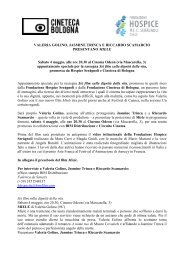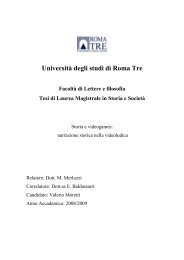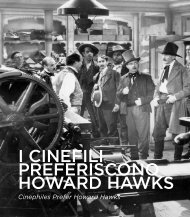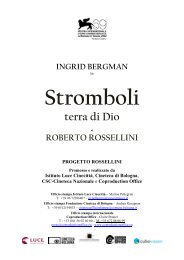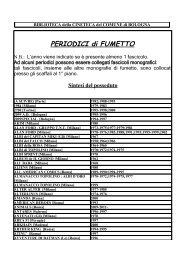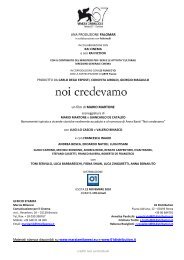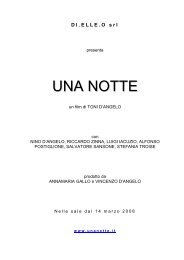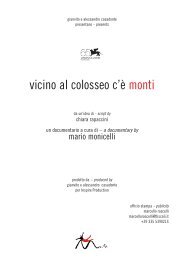Create successful ePaper yourself
Turn your PDF publications into a flip-book with our unique Google optimized e-Paper software.
AI CITTADINI DEL RITROVATO<br />
TO THE CITIZENS OF RITROVATO<br />
Peter von Bagh<br />
Negli otto giorni in cui la XXVI e<strong>di</strong>zione del Cinema Ritrovato<br />
illuminerà le nostre vite, le voci sulla morte del cinema parranno<br />
follemente esagerate. 317 film, la maggior parte dei quali presentata<br />
nell’impeccabile forma originale (in celluloide, e nelle<br />
migliori versioni a nostra <strong>di</strong>sposizione), descriveranno un secolo<br />
perduto.<br />
Cosa ci svela la nostra macchina del tempo, nell’e<strong>di</strong>zione del<br />
2012? Cominciamo con un magnifico anniversario: i <strong>di</strong>eci anni<br />
della sezione Cento anni fa, questa volta de<strong>di</strong>cata al 1912. A<br />
quell’epoca i lungometraggi iniziavano a insi<strong>di</strong>are il fascino aleatorio<br />
delle miscellanee <strong>di</strong> cortometraggi. Da ammiratore <strong>di</strong> questa<br />
sezione voglio sottolineare con quanta eleganza la sua curatrice<br />
Mariann Lewinsky sia riuscita nell’impegnativo compito, in<strong>di</strong>viduando<br />
ben 96 film che esprimono l’essenza <strong>di</strong> quell’anno. Allora<br />
contava ancora la quantità <strong>di</strong> film, non il singolo capolavoro consacrato.<br />
Tutto era vivo e palpitante.<br />
I film che presenteremo nelle nostre quattro sale rifletteranno<br />
come sempre una personale visione della loro epoca e del cinema<br />
stesso, e al piacere <strong>di</strong> vederli si accompagnerà il piacere ancor<br />
più grande <strong>di</strong> capire cosa c’è <strong>di</strong>etro <strong>di</strong> essi. Gli anni Dieci <strong>di</strong> Lois<br />
Weber; il crollo <strong>di</strong> Wall Street nel 1929, che fece tremare anche<br />
il mondo del cinema; un’epoca terribile vista attraverso il prisma<br />
della ‘comme<strong>di</strong>a musicale kolchoziana’; gli anni Sessanta rispecchiati<br />
nel ‘cinema <strong>di</strong>retto’ del documentarista Mario Ruspoli. Paradossi<br />
ovunque, e forse un’ovvietà: capita che i film più allusivi<br />
siano capaci <strong>di</strong> raccontare la realtà che li circonda quanto le<br />
testimonianze più <strong>di</strong>rette. Posso anticipare brivi<strong>di</strong> <strong>di</strong> piacere alla<br />
visione <strong>di</strong> Shoes, The Big Trail, David Golder, Murder!, Kome<strong>di</strong>e<br />
om Geld, Gueule d’amour e <strong>di</strong> altri film che susciteranno la stessa<br />
reazione <strong>di</strong> sorpresa e gioia.<br />
Per esempio, chi ha mai visto il primo sonoro <strong>di</strong> Kenji Mizoguchi?<br />
Grazie a questo film ne sapremo <strong>di</strong> più sul grande cineasta<br />
giapponese e sull’anno 1930. Per una <strong>di</strong> quelle splen<strong>di</strong>de coincidenze<br />
che la logica inconscia dei festival cinematografici sembra<br />
creare, ben due importanti sezioni si concentrano sui primi anni<br />
Trenta. Vedremo la prima delle due parti <strong>di</strong> una retrospettiva curata<br />
da Alexander Jacoby e Johan Nordström sui primi sonori del<br />
Sol Levante, dove i muti regnarono fin oltre la metà degli anni<br />
Trenta. Il programma comprenderà non solo film più o meno noti<br />
<strong>di</strong> artisti come Kinugasa, Mizoguchi, Shimizu, Ozu e altri, ma<br />
tenterà anche <strong>di</strong> ricreare le modalità <strong>di</strong> visione <strong>di</strong> un’epoca in cui<br />
il cinema muto con commento benshi stava cedendo il passo al<br />
sonoro.<br />
The rumor about the death of cinema will seem like a wild exaggeration<br />
during the eight days that will illuminate our lives during<br />
the 26 th e<strong>di</strong>tion of Il Cinema Ritrovato. 317 films, most of them<br />
in their impeccable original form (meaning celluloid and mostly,<br />
at least this is our effort, in the best prints available) will capture<br />
a lost century and a few fleeting years more.<br />
What does our time machine reveal with the present 2012 e<strong>di</strong>tion?<br />
Let’s start with a beautiful anniversary – the tenth annual<br />
presentation of One hundred years ago, now focused on 1912.<br />
That was the moment when longer, feature-length films started<br />
seriously to shatter the fascinating aleatory mixtures of short<br />
films. As an admirer of Mariann Lewinsky’s programming, I want<br />
to point out how elegantly this <strong>di</strong>fficult equation has been conceived<br />
– once she located 96 films to express the essence of a<br />
single year. We are still in the period when the multitude, not<br />
canonized masterpieces, counted. Everything was breathing.<br />
As we enter the arena of what our four cinemas will offer, the<br />
same question is asked over and over again: the times that the<br />
cinema reflected, the personalities that made those times palpable.<br />
The pleasure of seeing the films, and the added pleasure<br />
of comprehen<strong>di</strong>ng what is behind them. The 1910s of Lois Weber.<br />
The Wall Street Crash of 1929 that also produced an earthquake<br />
in the world of the cinema. The most terrible of times<br />
seen through the prism of a ‘kolhoz musical’. The most secretive<br />
‘<strong>di</strong>rect’ view of the 1960s by the documentarist Mario Ruspoli.<br />
Paradoxes everywhere, as well as the fact that is perhaps obvious:<br />
every so often the most <strong>di</strong>screet films reveal as much about the<br />
circumstances around them as the more <strong>di</strong>rect testimonies. I can<br />
anticipate shivering pleasures watching Shoes, The Big Trail, David<br />
Golder, Murder!, Kome<strong>di</strong>e om Geld, Song of Siberia, Gueule<br />
d’amour... and parallel personal choices that do not include any<br />
of these titles but elicit the same surprise and joy.<br />
Who, for instance, has seen the first sound film of Kenji Mizoguchi?<br />
You will be able to see it here, and after that we will know<br />
mysteriously more about the great Japanese filmmaker and also<br />
about the year 1930. By one of those beautiful coincidences that<br />
the unconscious logic of film festivals seems to create, two main<br />
programs focus on the early Thirties. We’ll start a two-part retrospective,<br />
curated by Alexander Jacoby and Johan Nordström,<br />
about early Japanese sound cinema where the realm of silents<br />
lingered into the mid-1930s and beyond. The series will not only<br />
include unknown or very little-known films by the likes of Kinugasa,<br />
Mizoguchi, Shimizu, Ozu and others but a recreation of an<br />
9



